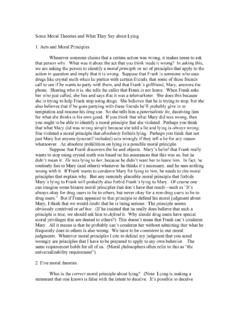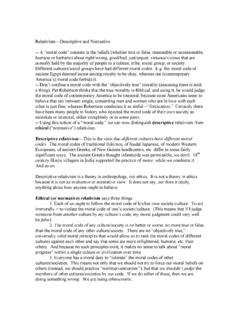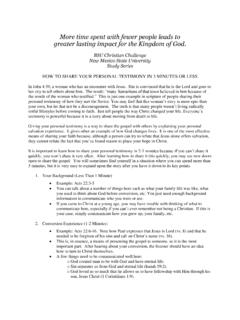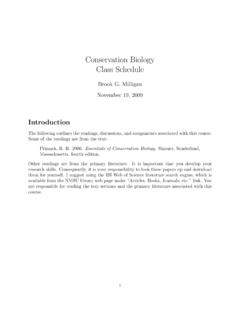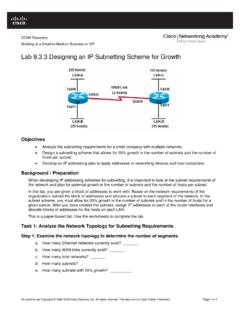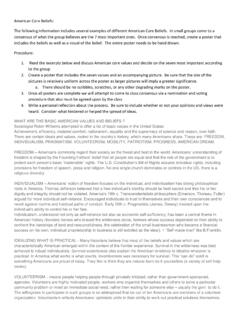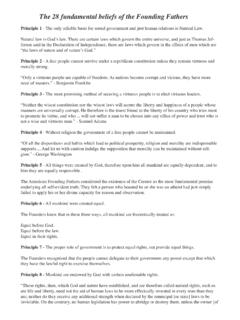Transcription of John Stuart Mill’s Political Philosophy
1 John Stuart Mill s Political Philosophy -- Mill embraces the Political Philosophy of classical liberalism. Classical liberalism holds that in order for the state to be fully just, it must protect and respect individuals rights. These rights include: one person/one vote, and anyone can run for public office. In short, democracy. ownership of one s own body and labor power. In short, no slavery. private ownership of natural resources (land, coal, etc.) and capital resources (tools, factories, railroads, etc.), and a right of every person to engage in free exchange with other persons.
2 In short, a capitalist economic system. the rule of law, due process of law, a fair trial if one is accused of a crime. free speech; speech should seldom if ever be restricted on the grounds that it advocates a viewpoint that is dangerous, false, and/or immoral, offensive to others, or unpopular. No viewpoint-based censorship. a sphere of personal privacy or liberty that includes (at the very least) decisions about which religion, if any, to adopt. -- Classical liberalism insists that the rights of individuals to due process, free speech, freedom of religion, etc. are nearly absolute.
3 One thing that does not justify violating them is the will of the majority. Majority rule should be limited by the requirement that individual and minority rights may not be violated. Another thing that does not justify the violation of individuals rights is the greater good of the community. -- Mill wants to defend what he calls one, very simple principle of liberty (p. 510). What is this principle? The only good reason that the state could ever have to restrict an individual s liberty is to prevent harm to other, nonconsenting persons. -- To understand Mill s principle, it will help to distinguish 3 different principles : 1.
4 The harm (to others) principle the state is justified in restricting a person s liberty to prevent harm to other, nonconsenting persons. 2. the paternalism principle the state is justified in restricting the liberty of a competent adult, even if he threatens no harm to others, simply to prevent him from harming himself. 3. the legal moralism principle the state is justified in restricting a person s liberty, even in cases where there is no danger of his harming others or himself, simply to prevent him from doing something that is intrinsicially immoral ( immoral even though it harms no one).
5 Here are some laws that can be defended by appeal to the harm principle: -- criminal prohibitions on murder, rape, robbery, physical assault, and defamation. Some laws that are commonly defended by appeal to the paternalism principle: -- laws that require car occupants to wear seat belts, or motorcycle riders to wear helmets; laws banning the recreational use of hard drugs, and that require one to have a doctor s prescription, before one can obtain many other drugs ( antibiotics); the mandatory withholding of Social Security contributions from one s paycheck. Some laws that are commonly defended by appeal to the moralism principle: -- criminal bans on the desecration of corpses; on prostitution, fornication, homosexuality, the distribution and/or consumption of pornography, etc.
6 Mill s one, very simple principle tells us that the harm principle is correct, but the paternalism and legal moralism principles are incorrect and should be rejected. -- There are two different ways of interpreting the harm principle. According to one, my act must be the cause of harm to others before the state may restrict it. According to another, my act needn t be the cause of the harm; all that s necessary is that the harm could be prevented if the state were to restrict my act. Suppose that I ve got a stock of surface to air missiles, you want to buy one from me for what you claim is self-defense, and I sell you one.
7 But you lied to me: instead of using it for self-defense, you use it to commit an act of terrorism (you shoot down an airplane full to innocent people). Since you re the one who is causing harm to nonconsenting third parties, not me, the first version of the harm principle says that the state may prevent you from firing your SAM at passenger airplanes, but it may not forbid me to sell them to the general public. According to the second version of the harm principle, the state may forbid me to sell SAM s to the general public, because even though my selling them doesn t cause any terrorist acts, a ban on their sale to the public will probably reduce the total number of terrorist acts committed with them.
8 good Samaritan Laws are laws that punish people for the failure to aid others in dire need, when they could provide such aid at little cost or risk to themselves. For example, I witness a severe traffic accident on an isolated road, I have a cell phone and could easily call the police, but I drive past the accident and don t place the call. Another example: Suppose that Jones pushes a small child who cannot swim into a swimming pool, and then he runs away. I happen to be walking by. I could easily bend over and pull the child out of the pool, but I choose not to because I m wearing my favorite shirt and worry that getting chlorinated water on my shirtsleeve will ruin it.
9 The first version of the harm principle does not support good Samaritan laws, while the second version does. Since Mill clearly believes that such laws are consistent with the harm principle (see the middle of p. 511), he must understand that principle in the second rather than the first way. -- Mill is a classical liberal because the one, very simple principle of liberty that he defends does seem to require of the state that it guarantee its citizens many of the liberties that classical liberalism cares so deeply about. For example, the state should guarantee freedom of religion/conscience, because a person s religious beliefs, by themselves, can t harm anyone else.
10 Mill would agree with a famous saying by Thomas Jefferson: It does me no harm if my neighbor worships one God, twenty gods, or no god; it neither picks my pocket nor breaks my leg. My beliefs might offend you, but that doesn t mean that they do or can harm you. -- Mill wants to defend classical liberalism as the correct Political Philosophy on the grounds that utilitarianism supports it. ( I regard utility as the ultimate appeal on all ethical questions, p. 511). His basic claim, quite simply, is that a state that respects and enforces the legal rights to the freedoms prized by classical liberalism will produce more total happiness, in the long run, than a state that doesn t respect and enforce those rights.
